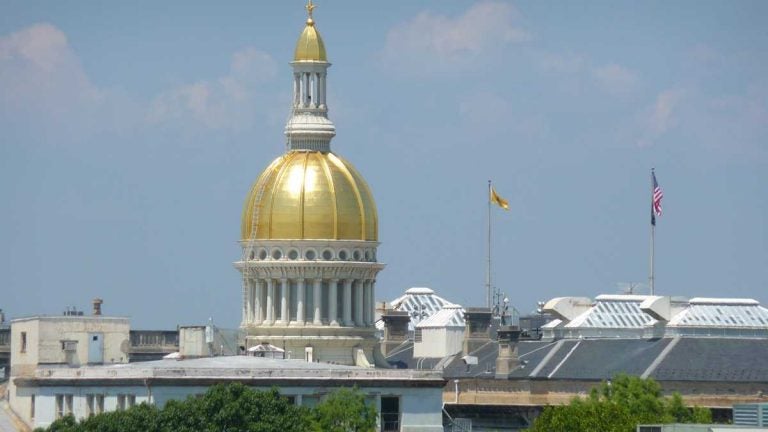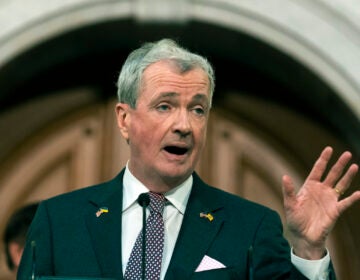N.J. government shutdown far more likely as budget talks hit wall
The sound of the clock ticking toward a government shutdown got far louder on Friday.

(Alan Tu/WHYY)
Update:
Gov. Phil Murphy and legislative leaders met for several more hours on Friday — and put some significant new concessions on the bargaining table — but they were ultimately unable to strike a deal, leading to either a government shutdown or massive budget cuts.
The most meaningful change in the ongoing budget negotiations was the lawmakers’ willingness to soften their stance on the governor’s proposal to establish a millionaires tax, with Senate President Steve Sweeney (D-Gloucester) and Assembly Speaker Craig Coughlin (D-Middlesex) saying they are now open to hiking taxes on those who make over $5 million annually. But Murphy, a retired Goldman Sachs investment banker, said that would in no way meet the revenue needs of the current budget. There were only “1,760 people in the state who earn that,” he said, adding, “I was not even one of them, if you look at last year’s tax returns,” while there were more than 20,000 people who earned more than $1 million.
For his part, Murphy said he is now willing to back off a proposal to restore a 7 percent sales-tax rate as part of a broader deal. But at the end of the day, each side accused the other of not being willing to bend enough, bringing the state to the edge of a government shutdown.
—
A deal on the state’s next fiscal year budget is once again going down to the wire in Trenton as lawmakers and Gov. Phil Murphy remained at odds over proposed tax increases, heading to the precipice of the deadline for a government shutdown.
Murphy, a first-term Democrat, hosted another round of high-level talks with legislative leaders yesterday, this time lasting for more than two hours. But when the negotiations broke up, no deal was announced, and Assembly Speaker Craig Coughlin (D-Middlesex) and Senate President Steve Sweeney (D-Gloucester) left, saying only that they would resume the discussions this morning.
“We had a good meeting and (we’re) looking forward to getting back at it,’” Coughlin said.
The planned resumption of the budget talks seemed to be a good sign, as earlier in the day Murphy led a meeting with his Cabinet to officially prepare for a potential shutdown, which would be triggered as early as midnight tomorrow if no budget deal can be reached. The governor also said later yesterday during a news conference at an elementary school in Trenton that he could still use his constitutionally authorized line-item veto powers to remove spending from a budget bill the Legislature sent him last week. That action would ensure state-run beaches, parks, and other government operations would remain open through the weekend, but it could also mean millions of dollars in spending would be cut from the lawmakers $36.5 billion budget.
Murphy: ‘I’m still optimistic’
“Everything has to be on the table,” Murphy said. “We’re war-gaming a whole series of different scenarios, but I’m still optimistic, we’re still trying to get a deal done.”
For their part, the legislative leaders had already canceled voting sessions that were scheduled for yesterday afternoon, and the Senate and Assembly went a step further yesterday by canceling voting sessions that were slated for this afternoon. That means under the current schedule it would likely be tomorrow, just hours before the midnight deadline for a government shutdown — as set down in the state constitution —when votes in both houses could be held on a compromise budget if they ultimately come to agreement.
While both sides have traded various numbers and compromise proposals in recent days — increasing the hope that they may be closing in on a deal — the dispute seems to be coming down to whether Murphy is ready to give up his insistence that the state create a millionaires tax to increase spending on key priorities like K-12 education. Legislative leaders have so far refused to accept that proposal, and they’re also blocking Murphy’s push to restore a 7 percent sales tax.
The jockeying over the state’s fiscal 2019 budget began in March when Murphy proposed a $37.4 billion spending plan that called for more state spending in several key areas, including K-12 education, public-worker pensions, and mass transit. Lawmakers have largely embraced Murphy’s spending goals, but they’ve balked at his main tax-hike proposals, establishing a 10.75 percent millionaires tax and moving the sales tax from 6.625 percent to 7 percent. Lawmakers have countered with their own revenue initiatives, including a tax-amnesty program and raising the corporate-tax rate on high-earning businesses for four years.
In a compromise offer floated by Murphy earlier this week, the governor signaled a willingness to accept some form of a corporate-tax hike and willingness to enact the tax-amnesty program sought by lawmakers.
Taxes on summer rentals
The legislative leaders responded with their own compromise offer which included a proposal to levy the current 6.625 percent sales on short-term property rentals as a way to raise $250 million in new revenue; that would put private summer rentals (those less than 90 days) on par with hotels at the state’s beach communities. The legislators’ compromise would also raise $110 million from raising the 1 percent tax on those buying commercial and residential properties worth over $1 million to 2 percent. Murphy did not embrace either proposal yesterday during his news conference, though he also didn’t summarily dismiss them.
More importantly, the governor also stayed dug in yesterday on his proposal for a millionaires tax, which was a core promise that he made during last year’s campaign. He said millionaires have made out well under the recent tax-policy changes enacted by President Donald Trump, including reduced personal income-tax rates. The governor also pointed to recent public polling that shows widespread support for a millionaires tax in New Jersey.
“It’s hard for me to get my mind around this given how obvious it is,” Murphy said.
But Sweeney has been a vocal opponent of the proposal, saying another feature of the federal tax overhaul — the capping of a longstanding federal write-off for state and local taxes known as SALT — could encourage the state’s highest earning residents to leave if they can no longer fully deduct what will be a higher state income-tax burden. The state’s highest earners typically cover a disproportionate share of the state’s income-tax haul, which is New Jersey’s largest single source of revenue.
Sweeney: ‘We’re in a disagreement’
“At the end of the day, we’re in a disagreement,” Sweeney said during a news conference on Wednesday.
It’s unclear whether Murphy is now willing to give up on the millionaires tax in order to get a broader deal on a budget, or if lawmakers are ready to stop blocking it to avoid a shutdown. This time last year, there was a short government shutdown when then-Gov. Chris Christie, a Republican, couldn’t reach a deal with the Legislature, which is controlled by Democrats. Instead of tax policy, that shutdown was largely caused by a dispute over education funding and how the state regulates Horizon Blue Cross Blue Shield, New Jersey’s largest health insurer.
Speaking about this year’s sticking point, Patrick Murray, director Monmouth University’s Polling Institute, suggested yesterday that Murphy simply isn’t willing to walk away from the millionaires-tax proposal.
“It really is just an intrinsic part of the definition of who he is as a progressive Democrat, that he needs to get this done,” Murray said. “He needs to claim this as one of his accomplishments.”
WHYY is your source for fact-based, in-depth journalism and information. As a nonprofit organization, we rely on financial support from readers like you. Please give today.




